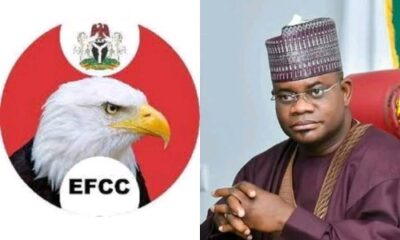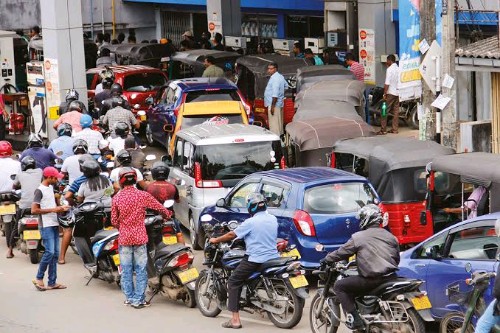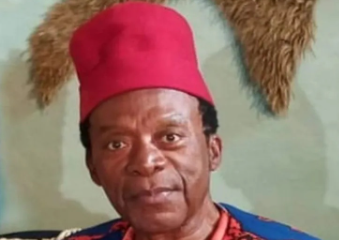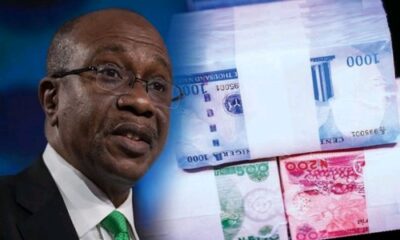BIG STORY
New Naira Scarcity: Sokoto, Zamfara, Katsina Border Residents Trade In CFA
Published
1 year agoon

Residents of border communities in states including Sokoto, Zamfara, Katsina, Adamawa and Kwara have opted for the CFA franc following the scarcity of the new naira notes across the country.
The residents, including traders and commercial drivers, are also rejecting the old naira notes, insisting that customers who do not have the new redesigned currency must pay for goods and services with CFAs.
The CFA franc is the legal tender in eight West African countries of Benin, Burkina Faso, Côte d’Ivoire, Guinea-Bissau, Mali, Niger, Senegal and Togo, which make up the West African Economic and Monetary Union, otherwise known as the Union Économique et Monétaire Ouest Africaine.
It was gathered that businessmen and traders in the Zurmi and Shinkafi local government areas of Zamfara State, which border the Niger Republic, prefer the franc to the naira.
Investigation revealed that traders in the two LGAs had been selling their commodities in CFA due to fear that they might not get the new naira notes.
A cattle dealer, Musa Shehu, said he stopped receiving the Nigerian currency since the Central Bank of Nigeria announced the deadline for the swap of the N1,000, N500 and N200 notes.
He stated, “I have since stopped receiving the old naira notes because I don’t have an account and I can’t go to the bank.”
A trader in Shinkafi town, who shuttles between Nigeria and Niger Republic, explained that most of his customers paid with the CFA.
“I cannot collect old naira notes and give out my commodities to any customer. But I will collect new naira notes and CFA because I am afraid of losing my money if the time for the exchange expires,’’ the trader, who spoke on condition of anonymity, said.
A grain seller in Dada village in Zurmi Local Government, Muhammadu Isa, disclosed that he stopped selling grains in the Nigerian currency after the CBN’s policy on new naira notes was unveiled.
He said that he sold only to those who possessed CFAs to avoid losing money as ‘’my father did in 1983 when the naira notes were hurriedly changed by the then Major General Muhammadu Buhari regime.’’
Isa explained that his late father lost all his money when Buhari changed the national currency in 1983.
The grain trader insisted that he would not accept the old naira notes as there was no bank or Point of Service terminal in his community where he could withdraw the new currencies.
“You see since our people and those from the Niger Republic are coming to buy the grains with the CFA, I see no reason why I should collect old naira notes. If anybody wants to buy grains from me, he must pay in CFA or forget it. I will not collect old naira notes because I don’t know what to do with them after the expiration of the deadline,” he noted.
In a related development, commercial drivers who ply the Niger Republic from Zurmi and Shinkafi LGAs have also stopped collecting the old notes.
They justified their decision with the argument that the CFA was the only legal tender accepted by the people along the Nigeria-Niger borders.
A driver, Alhaji Hamisu, stated that passengers had to pay in CFA if they wanted to travel to the Niger Republic or return to Nigeria ‘’because the old naira notes are unacceptable as legal tender.’’
Hamisu said, “I have on several occasions refused to collect the old naira notes from my passengers because I have no time to go to the bank or PoS to get the new notes.
“Another problem is that you can’t buy fuel with the old naira notes in Niger republic; as such, no commercial driver on cross-border journeys will agree to take the old notes from passengers.
“I was almost stranded in Malbaza town in Niger Republic when I wanted to buy fuel with the old naira notes because we have been doing so before the change of the Nigerian currency.
“I went to the filling station as usual and bought 30 litres of fuel and brought out the old notes but the fuel attendant told me that he would not accept the notes.
“I pleaded with him but he was not ready to collect the money from me. I was lucky as one of the commercial drivers, who is also my friend, came to buy fuel and he had enough CFAs. I bought the CFA from him and settled the fuel attendant.”
Sokoto Border Traders
Also, our correspondent discovered that border communities in Sokoto State preferred to sell their products in CFA due in part to the non-availability of the new notes and the continuous loss of naira value.
According to The Punch, Mallam Sidi Isa, who trades in cattle in Illela, a border community with the Niger Republic, said he preferred the franc because of the introduction of the new naira notes and the cashless policy.
Also speaking, Mr Jamiu Ola, a motor mechanic, argued that the CFA holds more value than the naira.
“I prefer CFA due to the fact that it is hardly devalued unlike our own naira which has been devalued,” he added.
A businessman, Mallam Haruna Abdulazeez, stated, “I shifted my business to the Niger Republic when I realised I can’t cope with the economy of this country anymore.
“If I buy goods from Nigeria and take same to Niger Republic, I make profits due to the value after the exchange. Even if you take sachet water there, you will make your profits due to the exchange rate.”
A Sokoto resident, Muhammad Auwal, submitted that the CFA holds more value than the naira, hence his preference for foreign currency.
“I normally exchange my naira for CFA as it is not reasonable for someone to keep naira at home due to loss of value,’’ he declared.
Adamawa Cattle Dealers
Speaking in an interview, the Chairman of Mubi International Cattle Market in Adamawa State, Jafaru Hamman, lamented the scarcity of newly redesigned naira notes, adding that the difficulties in getting the currency had affected commerce at the border communities.
The problem, according to him, is that most traders in Mubi are accustomed to cash transactions and the cashless policy may take time to get mass support.
Commenting on the decision of Adamawa communities to opt for the franc over the naira, a cattle dealer, Jafaru Hamman, explained that even before the CBN policy, some traders were using the West African CFA in business transactions.
He, however, noted the volume of trade in foreign currency was minimal before the introduction of the new naira redesign policy.
Jafaru said the development had made it increasingly difficult for most traders to get the new currency, thereby stifling their business operations.
According to him, as the deadline for the naira swap draws closer and the old currency is facing rejection, traders are faced with either accepting the CFA for their transactions or halting their business activities.
He said, “They (Traders) are collecting the naira but since it became increasingly difficult to get new notes, they resorted to collecting CFA. The traders have also refused to accept the old notes. If they come to sell their cattle, if you give them the old notes they will reject it.
‘’They would rather return with their cattle than accept the old notes. Nobody is seeing the new notes because they are scarce. Don’t forget that many of these traders don’t have bank accounts to accept transfers because our business is purely based on cash.’’
Katsina Traders Lament
The situation is not different at the cattle markets in Dankarma, Jibia and Maiadua, all in border communities in Katsina state.
Findings showed that trading was being carried out in these markets in both naira and CFA before the CBN policy.
But the naira notes scarcity had forced the majority of cattle dealers and traders to carry out all transactions in CFA.
However, a few traders accept electronic money transfers from those considered regular customers.
Mallam Ahmadu Ousseini who sells cattle and camels at Maiadua Kara International market, said he carried out most of his transactions in CFA because his customers said they could not get the new naira notes.
Ouseini said. “We accept naira and CFA here at Kara market. But in the past three weeks, I only accepted CFA for my transactions. There are a few customers I still accept cash transfers from as I have a PoS. When we conduct business in the CFA, we gain as the CFA is slightly higher (in value) than the naira.
“It is our customers who source for the CFA which they pay us. There are even those who help us change money in the market but they too cannot get the new naira notes now. This has made us transact business majorly in the CFA.”
Hajiya Bilikisu Ahmed, who is resident in the area but goes to sell cows in Lagos and other South-West cities, explained that the currency scarcity was affecting her business badly.
Ahmed stated, “I buy (cattle) from the dealers at Dankarma and Jibia with the naira. Occasionally, I exchanged my naira notes with the CFA in any of the cattle markets. But now, the scarcity of the new naira notes has worsened the matter.
‘’On Wednesday when I wanted to buy some cattle at Dankarma, I lost N3,000 on the N20,000 I exchanged for the CFA. The situation is compounded by the network challenges in many banks in Katsina. But I collected money from some of my customers down South, especially in Lagos and no matter the situation, I have to deliver to them, otherwise, they may not patronise me again.”
The cattle dealers further complained that the CBN policy had reduced the volume of cows being brought into the market in Borno State.
Recounting his pain, Mohammed Ali, a trans-border cattle merchant in Maiduguri, said, “I used to buy about 20 heads of cattle at Mada (a Cameroon market across the border from Gamboru in Borno State) and sell at least 15 weekly in the Maiduguri market.
“My problems as a cattle merchant are three: the CFA in the Cameroon market, which used to exchange at N560 per CFA, is now N680 per CFA, and in a few instances it is even more. The old naira notes are scarce and the new notes are nowhere to be found.’’
“In this situation, the majority of us have suspended the trade because we deal in hard cash, and it is not available; the sellers of the cattle across the border also deal in hard cash. They don’t accept bank transfers; they don’t even have bank accounts,” Ali explained.
Speaking further, he added, “By my estimates, between 500 to 700 heads of cattle arrive here daily from Chad and Cameroon to meet the number on the ground that has not been sold; but today (Monday, January 30), only about 50, according to what I saw, arrived.
“I sold only one cow today, and that is even on credit; the buyer said he could only pay by the end of February,’’ he lamented.
The chief cattle dealer of Bama, Mohammed Gwamna, said the situation had forced him to stop his cattle business.
“I have suspended the trade, whether trans-border or within the Nigerian border markets. The reason: if you go to the Cameroonian market with N1 million, you have to part with N100,000 to get it changed to CFA or new naira notes to enable you to buy the cattle, otherwise, the sellers will not even look at you.”
Stressing that the naira redesign policy had eroded his business and other people’s livelihoods, Gwamna observed that the cattle population in Maiduguri markets had reduced by about 80 percent.
He added, “By my estimate, this difficult situation has slashed the cattle population in this market by about 80 per cent, because most of us can’t even go to Gubio, Monguno and Gaidam (cattle markets in Borno and Yobe) to buy talk less of Cameroon, Niger or Chad markets because we can’t source the new naira notes. Without the new notes, nobody will even answer your greetings,” he lamented.
Another trader, Abba Ali, noted, “At Monguno, Ngala, Gubio (in Borno State) and Kukareta and Gaidam (in Yobe State), cattle will not be sold to you if you do not brandish new naira notes; and in Cameroon, you must show CFA; and both are not easy to find. This is the situation,” he complained.
“Hitherto, sometimes between 20 and 30 trailers offload cattle daily in this market; but today (Monday, January 30), according to what I have seen so far, only two trailers offloaded,” he observed.
In Ipokia, a border town in Ogun state, traders were said to have been travelling to the Benin Republic to exchange the new currency with CFAs after selling their wares.
A youth leader in Ipokia, Deji Mawuntin, bemoaned the hardship the residents of Ihunbe, Ilara, Oja-Odan and others were going through to get the new notes.
He accused unnamed bank workers of selling the new currencies to racketeers in the Benin Republic.
He noted, “The bankers are selling new naira notes to Beninese and Nigerians are going there to exchange it with CFAs. People have called the DSS operatives to beam their searchlight on these bank officials.”
In Kwara State, in Chikanda, a border town between Nigeria and the Benin Republic, a trader, Alhaji Bashir Mohammed, said he preferred taking CFA as new naira notes were not easily available.
He said, “Since the change from old naira notes to new notes, there has been a shortage of the new notes, we are not getting the new notes, so it is easier to get the CFA than the naira notes, that is why we are accepting the CFA in exchange for our goods.”
Another trader, Mrs Mariam Hassan, who trades in Garri, local rice, beans and yam flour, said that the traders in the border towns were accepting CFA in exchange for their goods.
Mariam who is based in Yashikira in the Baruten local government area of Kwara State said that the traders made more profits when they accepted CFA.
The CBN spokesman, Osita Nwanisobi, had yet to respond to questions on the displacement of the naira by CFA in parts of the country as of the time of filing this report.
But the Managing Director, Cowry Asset Management Limited, Johnson Chukwu, described the move as the logical thing to do in face of the scarce availability of the new notes.
Also, the Chief Executive Officer of the Centre for the Promotion of Private Enterprises, Dr Muda Yusuf, noted that this was natural due to the lack of enough new notes for people to run their businesses in border regions.
Credit: The Punch
You may like
-


How Binance Executive Tigran Gambaryan Planned Prison Escape, Applied For New US Passport
-


JUST IN: Protesters Storm APC Secretariat, Demand Ganduje’s Resignation
-


Fuel Queues Resurface As Scarcity Hits Abuja, Anambra 4 Other States
-


BREAKING: 118 Inmates Escape As Heavy Rainfall Destroys Suleja Prison
-


Kaduna Assembly Asks Finance Ministry To Provide Details Of Loans Obtained By el-Rufai
-


EFCC Withdraws Appeal Against Order Restraining Yahaya Bello’s Arrest, Says It Was “Filed Out Of Time”
BIG STORY
How Binance Executive Tigran Gambaryan Planned Prison Escape, Applied For New US Passport
Published
21 mins agoon
April 25, 2024
Tigran Gambaryan, the detained Binance Holdings Limited executive, has made attempt to escape from Kuje Correctional Facility.
According to The Punch, Mr Gambaryan who is currently remanded in Kuje Correctional Facility, applied for a new United States of America passport, under the pretence that his seized passport was missing.
EFCC sources, on Wednesday, under anonymity said that the Armenian-born Binance executive, Gambaryan who has both American and Armenian passports, told the US Embassy in Abuja that he lost his passport which is currently being held by the anti-graft Agency.
Following the development, the EFCC has urged the Federal High Court sitting in Abuja to disregard Gambaryan’s bail application, while noting that the Armenian-American could flee from Nigeria like his Kenyan-British colleague, Nadeem Anjarwalla who fled to Kenya.
A source, privy to the investigations, revealed that “The second Binance executive, Tigran Gambaryan, who is currently remanded in Kuje prison, has planned to escape from the facility. He applied to the US embassy in Abuja to issue him a new Visa while lying that he lost his passport which was seized by the EFCC.”
Another source, under anonymity, added that “Gambaryan could have escaped from Kuje if not for the fact that the US embassy flagged his request for a new passport. Fortunately, the US embassy immediately reached out to the EFFC, and the embassy was informed that he’s a criminal suspect whose case is currently in court for alleged money laundering – concealing the source of the $35,400, 000 generated as revenue by Binance in Nigeria knowing that the funds constituted proceeds of unlawful activity.”
Meanwhile, the EFCC had on Tuesday, urged Justice Emeka Nwite of the Federal High Court Abuja to deny Gambaryan’s bail application.
The anti-graft agency said it was too risky to admit the foreigner to bail, noting the escape of his co-defendant, Nadeem Anjarwalla, from the custody of the National Security Adviser and his escape to Kenya.
Besides, the prosecuting counsel for the EFCC, Ekele Iheanacho, told the court that the anti-graft agency uncovered an alleged plot by Gambaryan to obtain a new passport to facilitate his escape from Nigeria after the EFCC had seized his passport.
Gambaryan, his fleeing colleague, Anjarwalla, and Binance Holdings Limited are being prosecuted by the EFCC on money laundering charges.
The anti-graft agency accused them of concealing the source of the $35,400, 000 generated as revenue by Binance in Nigeria knowing that the funds constituted proceeds of unlawful activity.
Opposing Gambaryan’s bail application on Tuesday, the EFCC prosecutor said, “There was an attempt by this defendant to procure another travelling document even when he was aware that his passport was in the custody of the state. He pretended as if the said passport was stolen.”
Iheanacho told the court that within the same period that Anjarwalla fled the custody, Gambaryan also allegedly made moves to escape from custody and flee the country but was intercepted by the operatives of the commission.
“This court will be taking a grave risk to grant the defendant bail. This is also because he has no attachment to any community in Nigeria.
“The experience we have had with the man who escaped to Kenya while his United Kingdom passport is in Nigeria will certainly repeat itself if this defendant is granted bail.
“The 1st defendant (Binance) is operating virtually. The only thing we have to hold on to is this defendant. So, we pray My Lord to refuse bail to the defendant.”
Iheanacho said with the intelligence information at the EFCC’s disposal it was not safe to release the foreigner on bail.
BIG STORY
JUST IN: Protesters Storm APC Secretariat, Demand Ganduje’s Resignation
Published
3 hours agoon
April 25, 2024
Numerous protestors on Thursday stormed the All Progressives Congress (APC) national secretariat in Abuja, demanding the resignation of Dr. Abdullahi Ganduje, the party’s national chairman, in response to his recent suspension by a faction of his ward executives and the Kano State government’s alleged bribery charge against him.
Singing solidarity songs and carrying banners bearing the slogans “Ganduje must resign” and “Return the APC chairmanship to North Central,” the demonstrators urged President Bola Tinubu and Secretary to the Government of the Federation George Akume to take into consideration moving the party’s leadership back to their area.
The agitation comes two days after the Forum of APC State Chairmen passed a vote of confidence on Ganduje and backed him to remain as national chairman.
The delegation of 37 state chairmen gave the endorsement during a solidarity visit to the national secretariat of the party.
The former governor had recently been slammed with a fresh suspension by a faction of the Ganduje Ward in Dawakin Tofa Local Government Area of Kano, an action the ruling party said was carried out by some impostors allegedly being sponsored by the state government.
Addressing newsmen in Abuja, the protesters under the aegis of Concerned North Central APC Stakeholders lamented that the continued stay of Ganduje in office was a clear violation of the zoning process in the party.
Leader of the demonstrators, Mohammed Mahmud Saba, disclosed that, unlike the 37 APC state chairmen, his people in the North Central have passed a vote of no confidence on the national chairman and equally demanded his immediate resignation.
Saba reiterated that the people of North Central felt betrayed when the position of APC national chairman was hijacked from them following the exit of Senator Abdullahi Adamu despite giving Tinubu the third highest votes after North West and South West at the 2023 presidential election.
He said, “We the North Central APC Concerned Stakeholders have resolved to unanimously agitate for our right and reclaim our mandate which was handed unto us by the National Convention of our great Party in 2022. Various sections of our constitution have established the procedure of replacing an executive member at all levels of the party in the event of death, resignation, incapacitation or expulsion from the party by any executive member.
“It is a fact that the emergence of Dr. Umar Ganduje as national chairman was done against the spirit and soul of the APC which is the constitution of our great party. This singular act has impacted negatively on us as a people in the North Central. We feel betrayed and spited because we gave His Excellency, President Bola Ahmed Tinubu, the third highest votes after North West and South West in the country which put us in a better position to enjoy the fruit of our labour.
“We, therefore, demand that Dr Umar Ganduje resign immediately and stop parading himself as the National Chairman of our great party; the zoning arrangements made by the National Convention in 2022, which zoned the office of the national chairman to the North Central be respected by the NEC and all other organs of the party and that all governors elected on the platform of the APC in the North Central should wake up from their slumber and mobilize their members against this impunity until Ganduje resigns as the national chairman.”
BIG STORY
Fuel Queues Resurface As Scarcity Hits Abuja, Anambra 4 Other States
Published
3 hours agoon
April 25, 2024
Many filling stations in Abuja and roughly five other states are closed on Wednesday as scarcity of Premium Motor Spirit, also known as petrol cause heavy queues at few locations that dispensed the product.
The lack of PMS, which carriers need to operate their vehicles, left thousands of commuters in the Federal Capital Territory, Nasarawa, Niger, Gombe, Sokoto, and Anambra states stuck at several bus stops.
Due to the few transporters who had access to petrol, this resulted in an increase in transit fares in the impacted states.
It was gathered that the scarcity was due to a shortage in the supply of PMS to the nation’s capital and other states, as this led to the closure of filling stations in the affected areas.
Oil marketers, however, stated that they would hold a meeting with the management of the retail subsidiary of the Nigerian National Petroleum Company Limited today (Thursday) to know the cause of the shortage and how to tackle it.
Hundreds of motorists besieged the Conoil and Total filling stations that sold petrol in front of the corporate headquarters of NNPC in Abuja on Wednesday.
This led to vehicular traffic on the roads leading to NNPC headquarters and other surrounding companies in the Central Business District of Abuja.
Several filling stations in Zuba, Niger State, including NNPC, AYM Shafa, among others, were closed on Wednesday for lack of petrol to dispense.
Similarly, the NNPC outlet on Arab Road, Kubwa, Abuja, had no product to sell. Many other outlets along the Kubwa-Zuba expressway were also shut. In Nyanya, Nasarawa State, many filling stations were closed.
Their inability to operate piled pressure on the few stations that had PMS on Wednesday, leading to massive queues by motorists at these outlets.
Oil marketers, however, stated that the reason for the shortage in the supply of PMS to Abuja and neighbouring states was being investigated, adding that a meeting would be held on the matter today (Thursday).
According to The Punch, the National Secretary, Independent Petroleum Marketers Association of Nigeria (IPMAN), Chief John Kekeocha said “It is obvious that there is supply shortage in Abuja and other states that are close to the FCT (Federal Capital Territory)”
He added, “This is the reason why many filling stations in these areas are not selling PMS, which, of course, has led to the serious queues you see in the few ones that are dispensing the product. I cannot tell you the reason for this supply shortage now.
“But we are meeting with NNPC Regal tomorrow (Thursday), and this is going to form part of our discussions. The matter is being looked into right now, and we hope to find a solution to it during the meeting.”
Earlier, the National President, IPMAN, Abubakar Maigandi, told our correspondent that the queues for petrol in many states would be a thing of the past when the Dangote Petroleum Refinery starts pumping out PMS to the domestic market.
But when asked whether the refinery had briefed marketers about when it would start pumping out the product, Maigandi replied, “We don’t know the time. But since he said he would start it, I know that he will do that.
“So we are still waiting and we know that once he starts releasing petrol to the domestic market, this issue of fuel scarcity and queues will become a thing of the past.”
His position was corroborated by the IPMAN National Public Relations Officer, Chief Ukadike Chinedu, who also expressed hope that the Port Harcourt Refining Company would start producing refined petroleum products very soon.
- Commuters Stranded
It was gathered that thousands of commuters going to their various destinations were stranded at different motor parks in Anambra State on Wednesday due to the unavailability of transportation vehicles because of the shutting down of petrol stations across the state.
Most petrol stations in the major cities of Awka, Onitsha, Nnewi, Umunze, Ekwulobia and other environs remained shut and were not dispensing fuel on Wednesday morning.
As a result of this, the few vehicles plying the road increased the transportation fares by over 200 per cent while commuters who struggled to board them were made to pay the high rates.
For instance, commercial transporters charged N500 for a journey that used to be N200, while a journey of N500 was charged between N1,200 to N1,500.
The development caused many commuters to start trekking to their various destinations while others waited at the parks.
It was also observed that many offices and business premises did not open till around 10:30 am because their employees had yet to report for duty.
The reason why the petrol stations were closed could not be ascertained immediately. But the development generated a lot of mixed feelings among the public.
Some people believed that the petrol stations were on strike, others were of the opinion that it was a deliberate attempt by the marketers to increase the pump price of the commodity.
According to The Punch, a tricycle operator plying the Onitsha axis, simply identified as Tochukwu, said, “I bought fuel from the black market for as high as N1,350/litre this morning in order to work, after we discovered that filling stations did not open. Some of my colleagues went to Asaba in Delta State to get the product and that is why transportation fares are high this morning.
“We don’t really know why the filling stations are shut, but we are hearing that is like they are in a meeting somewhere in Awka. We have experienced this kind of situation before and when they came back from their meeting that day, they hiked the pump price of petrol. It’s likely to be the same situation, we are watching as events unfold.”
A commuter at Awka, Chinwe Okeke, said, “I have been standing at the Regina Caelis Bus Stop for over two hours waiting to board a vehicle to UNIZIK, but it has been difficult. The vehicles that are coming have been charging very exorbitantly, I don’t know what is really happening.”
When contacted on the development, the Anambra State Commissioner for Petroleum and Mineral Resources, Anthony Ifeanya, said, “There is no cause for alarm and commuters and motorists should not panic.
“It’s likely that the petrol marketers are in a meeting and whenever they are having such meeting, shutting of petrol stations is a way of compelling every member to attend the meeting. Their meeting usually starts from morning till noon.”
It was also observed that the sudden fare hike also affected both interstate and intrastate movements.
- Queues In Lagos
It was observed that the NNPC filling station along Cele expressway in Lagos had long queues on Wednesday due to the fact that the pump price was selling at a lower rate of N585/litre when compared to other filling stations.
But the AP filling station located at Barracks along Chemist Bus Stop in Lagos was not selling petrol.
However, there were no queues at Jezco filling station at Oja-Oba, along Pako Bus Stop in Lagos because the station was selling at N650/litre.
The Northwest filling station along the Gbagada expressway had long queues as the pump price at this station was N610/litre.
Heavy queues were seen at the NNPC filling station along the Ogudu expressway with the station selling at N585/litre.
- Fuel Sells At N710/Litre In Ogun
Residents of Abeokuta, Ogun State capital now buy a litre of petrol for between N650 and N710/litre.
It was observed that while many of the filling stations were not selling fuel on Wednesday, the few independent filling stations that were attending to customers sold the product at between N660 to N710/litre.
However, the NNPC mega station along Abiola Way dispensed a litre for N580 but the queues here were very long.
Eternal Oil along Kobape road with a fairly large crowd sold petrol for N660/litre while others such as KH filling station, Adigbe, among others, sold theirs at N700/litre and above.
- Scarcity In Gombe
Fuel scarcity has hit most filling stations in the Gombe State metropolis.
Some motorists told our correspondent in the state that they suspected sabotage, as fuel was sold for between N760 to N800/litre depending on the station. The worst hit areas are the hinterlands.
Bako Hussain, a motorist, said, “We know that it is a sort of plan work by the filling stations. How can one open today and tomorrow the next one will open and the one that sold yesterday will not open.”
Also speaking, Hajara Bala, said “It is hard to get fuel in the state as the queues are building across filling stations. I think it’s artificial scarcity. I see no reason why we will have money and still wait with your N760 or more depending on the station.”
Motorists in Sokoto State also decried the continued rise in the price of petrol as the product rose to N830/litre on Wednesday.
Findings (by The Punch) in Sokoto on Wednesday evening showed that most of the filling stations that opened for business in the morning had closed their outlets before 4 pm, making the product more scarce for consumers.
Almost all the big marketers including NNPC, AA Rano, Shafa, among others, were not dispensing the product on Wednesday evening.
The few filling stations that dispensed the product on Wednesday evening sold it at between N800 and N830/litre and still had long queues.
A motorist, Abdul Ahmad, said, “How do you explain a filling station which sells fuel at the rate of N770/litre in the morning, only for you to come back in the afternoon and same people now sell at N820/litre.
“This is very bad and we should stop doing this to ourselves in this country.”
- NNPC Silent
Meanwhile, efforts to get the NNPC to explain reasons for the queues and the fuel supply shortage in states were unsuccessful.
NNPC is currently the sole importer of petrol into Nigeria, as other marketers stopped importing the commodity due to their inability to access adequate foreign exchange required for PMS importation.
NNPC’s spokesperson, Olufemi Soneye, did not answer calls to his phone when contacted on the matter.
Credit: The Punch

How Binance Executive Tigran Gambaryan Planned Prison Escape, Applied For New US Passport

JUST IN: Protesters Storm APC Secretariat, Demand Ganduje’s Resignation

Fuel Queues Resurface As Scarcity Hits Abuja, Anambra 4 Other States

BREAKING: 118 Inmates Escape As Heavy Rainfall Destroys Suleja Prison

Kaduna Assembly Asks Finance Ministry To Provide Details Of Loans Obtained By el-Rufai

How I Survived Suicidal Thoughts, 14 Heartbreaks, 15 Abortions, Divorce And Alcoholism — Lara Kudayisi Don-Momoh [VIDEO]

BREAKING: EFCC Arrest, Detain Bobrisky

BREAKING: Bobrisky Sentenced To 6-Month Jail Term Without Option Of Fine Over Naira Abuse

Jnr. Pope: My Opinion On The Boat Crash That Claimed The Life Of Nollywood Talents By Seun Oloketuyi

Yahaya Bello: Lawyer Asks Kogi Assembly To Begin Impeachment Process Against Ododo
JoIn Us On Facebook
Most Popular
-

 ENTERTAINMENT3 days ago
ENTERTAINMENT3 days agoI Slept With A Female Producer To Land A Movie Role — Nollywood Actor Seun Jimoh
-

 BIG STORY1 day ago
BIG STORY1 day agoNollywood Losses Another Veteran Actor, Zulu Adigwe
-

 BIG STORY3 days ago
BIG STORY3 days agoFG Begins Loan Disbursement Process For MSME, Manufacturing Sector [See Criteria/How To Apply]
-

 BIG STORY1 day ago
BIG STORY1 day agoYahaya Bello Not Running From The Law, EFCC Lied, They Never Invited Him — Ex-Gov’s Media Office
-

 BIG STORY2 days ago
BIG STORY2 days agoJUST IN: EFCC To Arraign Former CBN Governor Emefiele On Fresh Charge, Says He Printed N684.5m Notes With N18.9bn
-

 BIG STORY2 days ago
BIG STORY2 days agoBREAKING: EFCC Arrests Former Aviation Minister Hadi Sirika Over Alleged N8bn Nigeria Air Fraud
-

 BIG STORY3 days ago
BIG STORY3 days agoBREAKING: Soldiers Dismissed For Stealing Armoured Cables From Dangote Refinery
-

 BIG STORY2 days ago
BIG STORY2 days agoI’ll Resign If Yahaya Bello Is Not Prosecuted — EFCC Chairman Olukoyede














